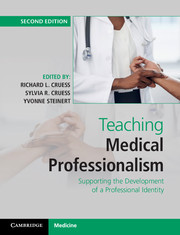Book contents
- Frontmatter
- Contents
- List of contributors
- Foreword
- Introduction
- Part I What is to be taught and learned
- Part II Theory
- Part III Principles
- Part IV Case studies in promoting professionalism and professional identity formation across the continuum
- Part V The future
- 19 Professional identities of the future: invisible and unconscious or deliberate and reflexive?
- Index
- References
19 - Professional identities of the future: invisible and unconscious or deliberate and reflexive?
from Part V - The future
Published online by Cambridge University Press: 05 April 2016
- Frontmatter
- Contents
- List of contributors
- Foreword
- Introduction
- Part I What is to be taught and learned
- Part II Theory
- Part III Principles
- Part IV Case studies in promoting professionalism and professional identity formation across the continuum
- Part V The future
- 19 Professional identities of the future: invisible and unconscious or deliberate and reflexive?
- Index
- References
Summary
The philosophies of one age have become the absurdities of the next, and the foolishness of yesterday has become the wisdom of tomorrow.
Introduction
In writing this chapter, I was given the task of pondering physician identities of the future. This deceptively complex challenge led me, by necessity, first into the past to see from whence we have come; then to scrutinize the present with the aim of finding clues to changes that might be in progress; and finally to project from the past and the present into a future – or more correctly, futures – that I can only half imagine.
Before launching into a consideration of those futures, it is important to do a little groundwork on what is meant by future and what gazing in that direction entails. I believe it is important to locate myself so as to make sense of my analysis. Briefly, I am a social constructionist, interested in history and discourse; a word about each follows.
Social constructionism
Some years ago I had the pleasure of chairing a group of international experts on the assessment of professionalism. The task assigned to us was to come up with a consensus on the assessment of medical professionalism. The most important contribution of this task force was to state that consensus was neither possible nor desirable. Indeed, the hard work of the committee was the identification of the wide range of beliefs about what we could say is known (epistemologies) about professionalism. We created a framework to help orient the many voices and perspectives on professionalism, a framework that was widely welcomed as helpful.
The editors of this book have adopted the notion that professionalism is no longer, on its own, a sufficiently robust construct to capture the process that underpins becoming a physician; they would like to see a shift in the teaching of professionalism to support the development of professional identity. Had our task force, back in 2010, discussed identity rather than professionalism I am certain we would have encountered an equally diverse set of perspectives about what identity might be. Then, as now, my perspective is the one expressed as social constructionism: that professionalism and identity are social constructions arising from cultural contexts.
- Type
- Chapter
- Information
- Teaching Medical ProfessionalismSupporting the Development of a Professional Identity, pp. 277 - 287Publisher: Cambridge University PressPrint publication year: 2016
References
- 3
- Cited by



